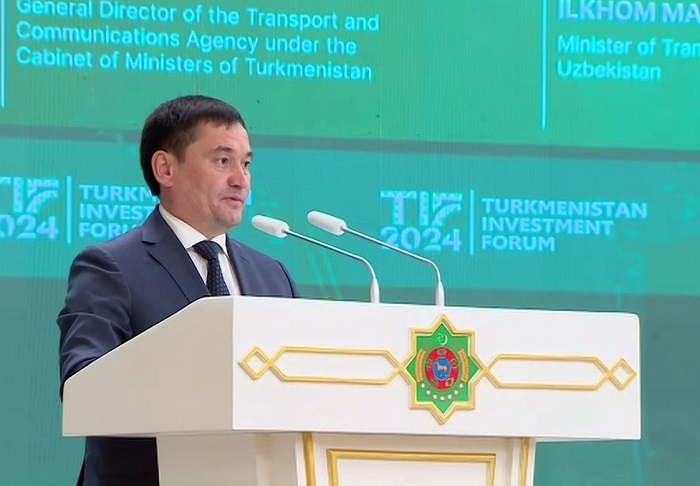Ilkhom Makhkamov, Minister of Transport of Uzbekistan, outlined his country’s efforts to enhance regional and interregional transport connectivity at the TIF 2024 Investment Forum in Ashgabat.
Makhkamov highlighted several key transport initiatives involving Turkmenistan, Kyrgyzstan, and Kazakhstan.
In order to create the shortest route to the World Ocean for the countries of Central Asia, as well as to increase the transit potential of the region, Uzbekistan is actively working on the implementation of projects for the construction of railways China-Kyrgyzstan-Uzbekistan and Uzbekistan – Afghanistan – Pakistan.
Experts predict that the China-Kyrgyzstan-Uzbekistan railway will become the most direct route from China to Europe and the Middle East.
Makhkomov noted that the volume of traffic on the multimodal route China-Kyrgyzstan-Uzbekistan has surged by over 20 times.
The Uzbekistan-Afghanistan-Pakistan railway project will connect South Asian, Central Asian, and Eurasian railway systems. This new rail route is expected to transform trade and economic cooperation on a continental scale, the minister said.
According to preliminary estimates, the project will reduce the cost of transporting goods from Pakistan to Uzbekistan by three times and decrease delivery times to 3-5 days.
Uzbekistan’s Minister of Transport emphasized that this project should be viewed not only as an economic opportunity but also as a means to promote peace and economic progress in Afghanistan.
Makhkamov urged countries to work together to diversify transport routes, prevent disruptions in cargo supply chains, and develop new transport corridors amidst the increasingly complex global and regional landscape.
In response to these trends, Uzbekistan has been actively working to establish and develop promising transport corridors, including Russia-Caspian Sea-Turkmenistan-Uzbekistan-Kyrgyzstan and Belarus-Russia-Kazakhstan-Uzbekistan-Afghanistan-Pakistan. These corridors will strengthen the region’s transport and logistics capabilities, promote trade among CIS countries, Central Asia, South Asia, and Southeast Asia, and open markets with a population over 1.5 billion people.
Makhkamov proposed intensifying cooperation in cargo transportation along the southern route, China-Kazakhstan-Uzbekistan-Turkmenistan-Iran-Türkiye-EU and China-Kyrgyzstan-Uzbekistan-Turkmenistan-Iran- Türkiye-EU.
He expressed Uzbekistan’s readiness to create favorable conditions for expedited cargo delivery and offer preferential tariffs along these routes on a mutually beneficial basis.
The Minister of Transport of Uzbekistan proposed to integrate the existing transport network of the region into a single transport system to turn the region into a major hub between North and South, West and East.
He pointed out the need to unify and harmonize the technical standards of national legislations with international norms and standards set out in UN agreements and conventions, to introduce technological innovations, in particular by switching to paperless document management through the introduction of solutions such as ePermit, eTIR, eTransit.
By now, Uzbekistan and Kazakhstan have completely switched to the ePermit.
According to Makhkamov, negotiations were held on the sidelines of TIF2024 with Mammetkhan Chakiyev, Director General of the Agency for Transport and Communications under the Cabinet of Ministers of Turkmenistan, during which an agreement was reached on the early digitalization of transport document management with Turkmenistan. ///nCa, 10 September 2024
